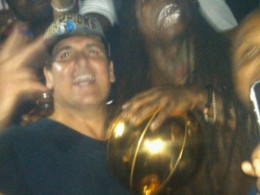 It’s over now, the journey that led the Mavericks through heartbreak and frustration and, finally, redemption. They won the title Sunday. They beat the Heat and bathed in champagne, 250 bottles worth apparently.
It’s over now, the journey that led the Mavericks through heartbreak and frustration and, finally, redemption. They won the title Sunday. They beat the Heat and bathed in champagne, 250 bottles worth apparently.
After 13 seasons, Dirk Nowitzki and Mark Cuban finally became champions. They made their mark. They partied with Lil Wayne.
Dallas was the unexpected contender. Few expected them to get out of the first round, much less win it all. They kept coming, though. Kept coming like a tidal wave, Hurricane Dirk crashing on the shores of Portland, Los Angeles, Oklahoma City and Miami. Hurricanes Terry and Barea crashing intermittently behind. Rick Carlisle orchestrating the whole thing like Poseidon, a crafty, Grinch-looking sea wizard.
The Mavs were resolute. They didn’t complain when they lost, didn’t brag when they won. They were a team of destiny. They defied setbacks and challenges, including Dirk’s illness and the injury to Brendan Haywood. Like Khal Drogo they aimed to mount the world, and they did. Few of them did it beside a woman as hot as Daenerys, though. And by few I mean J.J. Barea. Lucky jerk.
Ultimately, the Mavs stunned LeBron James and Dwyane Wade and won their first title in franchise history.
How did they pull it off? Here were three keys to Dallas’ 2011 Finals victory:
1) Dirk Nowitzki
No rocket science behind this one. Dirk rose to the occasion in a way only legends can. In the Western Conference Finals, his performance bordered on flawless. In the Finals, he was no longer untouchable — simply obstinate. He wouldn’t take no for an answer. But that worked just as well.
Through good nights and bad, Dirk carried the Mavs. He battled through fever in Game 4 to score 21 points and grab 11 rebounds. The Heat mocked him, but he only came back stronger, putting the choke hold on them with 29 points (on 9-of-18 shooting) in Game 5.
In Game 6, Dirk’s shot betrayed him (he went 1-for-12 in the first half). But he fought through that too, scoring 10 points in the fourth quarter to deliver the final blow. In all, he scored 62 fourth quarter points in the Finals. He averaged 26 points, 9.7 rebounds overall and shot almost 98 percent from the free throw line. He kicked LeBron and Wade aside like fourth grade bullies. Hey, Big 3, who’s your daddy?
Through it all, Dirk showed enormous dedication. You could see the determination in his eyes every time the Mavs closed in on victory. I will not be denied. I will not lose. Now he’ll be remembered among the greats (Jordan, Bird, Magic, Russell, Kareem), a player who imposed his will on the other team at the highest level of competition.
Dirk has often played at the level of legends. It’s great that he’ll now be recognized as now.
2) Rick Carlisle’s coaching adjustments
After three rounds of brilliant basketball, the Mavs were on a precipice in the Finals. Down 2-1 to the Heat after three games, they were obviously being outplayed (even in Game 2, a game they won). Rick Carlisle brought them back, though. He responded to Miami’s athletic advantage with some key tactical adjustments: inserting J.J. Barea into the starting lineup, relegating DeShawn Stevenson to the bench and cutting Peja Stojakovic’s minutes entirely.
With Barea in the lineup, the Mavs became a better offensive team. His cuts to the hole not only increased his own offensive efficiency (he was shooting poorly in the first three games), but also created more opportunities for guys like Tyson Chandler and Shawn Marion, who thrive on garbage buckets. And because Mike Bibby was basically a ghost of himself throughout the series, Dallas didn’t lose anything on the defensive end by having Barea in the game.
Stevenson gladly filled the role of all-purpose defensive sub who hits open threes and tries to provoke the opposing team into technical fouls (which was essentially the role he was playing as a starter), and Stojakovic, well, let’s face it, he didn’t deserve to play anyway. His time came and passed with the Lakers series.
It was exactly the right move. The Mavs reeled off two straight wins, adding a third after another crucial decision from Carlisle: changing into zone defense in the first quarter of Game 6 to stop a red-hot Heat run. Miami immediately cooled down, and Dallas went on to win the final game 105-95.
As John Hollinger wrote, Carlisle was terrific. He optimized what the Mavericks did well (3-point shooting, ball movement, team defense) while hiding their weaknesses (old age and a lack of athleticism). His counterpart, Erik Spoelstra, did not — namely by leaving Bibby in the starting lineup until Game 6 and not finding a way to create opportunities for LeBron around the basket. As a result, Mark Cuban’s holding the Larry O’Brien Trophy somewhere while Pat Riley drunk dials Phil Jackson for roughly the 4,000th time today.
The lesson: coaching always matters — even if its being delivered by a guy six penguins short of Mr. Popper’s Penguins.
3) Bench scoring
The Heat were a very good team this season. To some they seemed unbeatable. Depth was always their Achilles heel, though. You can’t ride into a gun fight against the Magnificent Seven with three legitimate gunslingers (LeBron, Wade and Bosh), a steely-nerved amateur (Mario Chalmers) and three guys barely sober enough to fire their weapons (Bibby, Mike Miller and Udonis Haslem) and expect to win.
The Mavericks had a distinct bench advantage. Their reserves outscored the Heat reserves in four of six games (Games 2, 3, 4 and 6), and in three of those games the advantage was double digits.
Jason Terry did the majority of the damage, of course, cruising to an altitude of 18 points per game while shooting over 47 percent from the field and over 44 percent from three. He scored over 20 points twice (in Games 5 and 6), and was a three-pointer away from doing it a third time (in Game 4). He also carried the Mavs in Game 6 when Dirk was mired in a 1-12 shooting slump, finishing with 27 points.
To put that in perspective, Chalmers, the Heat’s highest scoring bench player, averaged just 11.8 points per game. He approached the 20-point mark just once in the series, and that was in Game 6, when he was named the starter in place of Bibby.
Haslem played well. Aside from him and Chalmers, though, no Heat bench player was much of a factor.
Mike Miller was atrocious, Juwan Howard was spotty, Eddie House was eh, and James Jones saw less time on the floor than a Swiffer in room 4C. Meanwhile, Terry was lighting it up like Christmas on one of those nice streets, Stevenson was bombing threes and Brian Cardinal was doing goofy white boy things to loosen everybody up — you know, the opposite of what Mike Miller was doing.
In all, the Mavericks’ bench outscored the Heat’s 168-132 in a series where the final differential was under 20 points (568-554 in favor of Dallas). That margin, along with Dirk’s career-defining performance and Rick Carlisle’s series-saving personnel moves, was what put the Mavs over the top.
Congratulations to a well-deserving champion.

